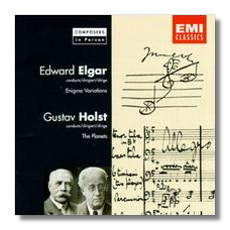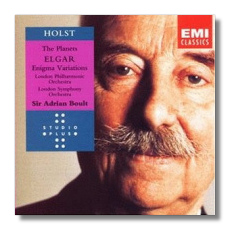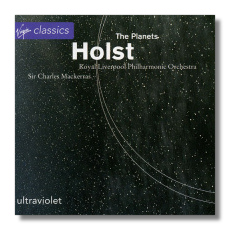
The Internet's Premier Classical Music Source
Related Links
- Holst Reviews
- Latest Reviews
- More Reviews
-
By Composer
-
Collections
DVD & Blu-ray
Books
Concert Reviews
Articles/Interviews
Software
Audio
Search Amazon
Recommended Links
Site News
 CD Review
CD Review
Gustav Holst

The Planets
- The Planets
- Edward Elgar: Enigma Variations *
London Symphony Orchestra/Gustav Holst (1926)
* Royal Albert Hall Orchestra/Edward Elgar (1926)
EMI Composers in Person CDC 54837 ADD 69:57


- The Planets
- Edward Elgar: Enigma Variations *
Geoffrey Mitchell Choir
London Philharmonic Orchestra/Adrian Boult
* London Symphony Orchestra/Adrian Boult
EMI Studio Plus CDM 64748 ADD 78:34


- The Planets
- Ballet music from The Perfect Fool
Royal Liverpool Philharmonic Orchestra/Charles Mackerras
Virgin Ultraviolet CDZ 64749 (EMI 61257) DDD 60:28
In September 1918 the 30-year-old Sir Adrian Boult "first caused The Planets to shine in public" as Holst himself inscribed on Boult's copy of the score. In fact the performance was a private one, given on a Sunday morning in the old Queen's Hall, the gift of that ever-generous fellow composer Balfour Gardiner to Holst, about to depart for Salonika.
Almost exactly 60 years later Boult made his fifth – and final – recording of The Planets. This recording, then is surely unique; not only does it give us the great conductor's last thoughts on a work which he premièred, it is also one of the very finest recordings ever made of the work. (It was also simultaneously recorded in the then-new digital sound, although that recording has never, to my knowledge, been issued).
Amid many fine things here, perhaps the finest of all is the nonagenarian Boult's bleak – and singularly authoritative – reading of Saturn, the Bringer of Old Age, which the composer himself believed to be the finest movement.
It would be easy to criticise Boult for his "traditional" approach to this music: but who has more right to that than the creator of the tradition himself?
While the accompanying 1970 recording of Elgar's Enigma Variations, another work which Boult recorded numerous times, is not quite in the same stellar league, it is nevertheless a fine performance, and far better than his rather restrained 1962 recording.
At mid-price this disc is a bargain.
Holst's own recording, although he was no conductor – his daughter Imogen recalled his walking around the room practising beating the tricky 5/4 time of Mars – also has special claims on the collector's attention. The 1926 Planets was his second; the first, an acoustic recording made in 1923, was one of the most trying occasions of his entire career – the cramped studio becoming so hot that the horn player eventually collapsed after thirteen takes of Venus.
While one must make allowances for the somewhat restricted sound, Holst took a singular view of his own work – his Mars, for instance is the quickest I have ever heard – and his insights are undoubtedly valuable.
The coupling, Elgar's second, 1926 recording of the Enigma Variations is similarly compelling, providing, again, that you can take the sound.
Finally, for those who believe that one can only truly appreciate an orchestral showpiece like The Planets in modern digital sound, let me tell you about what seems to me to be the finest of them all.
Sir Charles Mackerras's 1988 recording presents a fresh, vital view of this, at times, overfamilar masterpiece. His Mars, for instance, outdoes even the composer in its extremes of tempo and brings out the violent closing discords more clearly – and terrifyingly – than I ever recall having heard before. Make no mistake, in Mackerras's hands Mars really is frightening.
But perhaps his most impressive achievement is Mackerras's account of Jupiter, the Bringer of Jollity, where, in the famous central melody ("England's third national anthem"), while never avoiding the obvious links to Elgarian nobilmente, he also manages to underline Holst's affinity with the music of his great friend Ralph Vaughan Williams.
According to Imogen Holst, at that first performance, during Jupiter "the cleaners at the Queen's Hall put down their brushes and began to dance." One can scarecly imagine anyone dancing to the overrated, lacklustre and decidedly un-jovial (pun intended) Dutoit/Montréal performance, but Mackerras unerringly shows us how it should be done.
The ballet music from The Perfect Fool makes a fine, and appropriate coupling, the RLPO play marvellously and the recording is absolutely superb.
If you want just one Planets, I would suggest the budget-price Mackerras; but true believers will surely want all three of these discs.
Copyright © 1996, Deryk Barker


















